When metal parts age, like the hinge on your door or nails in the fence, they become rusty. This chemical change alters the properties of metal. Instead of being sturdy and smooth, rusted metal is weakened, fragile and flaky. Ultimately, rust means that these objects don’t work as they should, the door creaks and the fence pails fall down with every puff of wind. This slow decline in structure and function is common to the aging process, as is its chemistry. Like the nails in the fence, we are also constantly exposed to oxygen.
Oxygen is the essence of the air we breathe. It is vital for the creation of energy. But this dependence comes at a cost. During metabolism a small proportion of oxygen is converted into toxic products, collectively known as Reactive Oxygen Species (ROS or free radicals). When attacked by free radicals, proteins, DNA and lipids don’t work as they should, and as with rusty metal, function declines. As we get older and our systems for metabolizing oxygen become less efficient, our production of free radicals increases. If the production of free radicals outstrips our (antioxidant) defense mechanisms, a state of oxidative stress is said to exist. Oxidative stress is one of the most important elements of the aging process. There is a lot we can do to bolter our antioxidant defenses, as well as erode them prematurely. Unequivocally, diets naturally high in antioxidants can improve health and prolong life and have done so for centuries.
Options for increasing your intake of antioxidants
- Eat fresh food
- Plant a vegetable garden. If you are in an apartment then plant one in a pot
- Check out your local farmer’s market and shop there on the weekend
- Avoid anything in a sealed packet or tin
- Shop online and so avoid impulse purchases at the supermarket
- Eat whole foods that retain their natural antioxidants (whole grain, whole fruit and vegetables)
- Increase your intake of herbs
- Buy parsley, chives, coriander, sage and thyme and other salad herbs and keep in a sealed container for daily use in salads, soups, curries and casseroles
- Plant some basil so you can easily make your own quick pesto sauce – blend pine nuts, garlic, basil and olive oil
- Reduce your intake of coffee and soft drinks and increase the intake of herbal teas such as lemongrass, camomile, liquorice or peppermint
- Try new salads that are predominately made from herbs such as tabbouli (parsley). Also Sabzi or herb salad is made from fresh spinach, rocket, celery, mint, parsley, basil, dill, spring onions, olive oil and lemon juice
- Increase your intake of spices
- Toss turmeric with fish and rice with steamed veges for a quick meal
- Have a curry meal once per week
- Stew apples, rhubarb or pears with cinnamon sticks and cloves; serve with yoghurt for a delicious dessert or breakfast
- Substitute your coffee for a chai latte
- Add chilli flakes to your spaghetti sauce
- Add turmeric to taste to scrambled eggs
- Sprinkle cinnamon on your porridge
- Follow the rainbow to get important antioxidants via your food
- Orange and deep yellow = beta-carotene. Try carrots and apricots, cantaloupe, grapefruit, oranges, mangoes, papaya, pineapple, peaches, bananas, butternut squash and yellow peppers
- Red and pink = lycopenes and ellagic acid. Try raspberries, red grapes, tomatoes, guava, apricots, watermelon, papaya and pink grapefruit
- Dark green = lutein and zeaxanthin. Try spinach, silverbeet, romaine lettuce, broccoli, zucchini, corn, green peas and Brussels sprouts
- Purple, dark red and blue = flavonoids. Flavonoids are the most abundant and powerful of all the phytochemicals contained in the foods we eat. Try blackberries, blueberries, dried plums/prunes, raisins, purple cabbage, eggplant and purple potatoes
- Increase your intake of fresh fruit
- Slice fresh fruit over porridge
- Make delicious fruit-based desserts, such as fruit crumble with apple and rhubarb, baked apples or poached seasonal fruit such as pears or stone fruit
- Dice fresh fruit and take to work as a quick convenient snack rather than eating a muesli bar
- Make a delicious fresh fruit platter for breakfast, a snack or for dessert
- Dice fresh fruit and keep in a container in the fridge so it is a quick convenient snack – this works well with fresh melon
- Have a smoothie if you are on the run and tend to miss breakfast
- Increase your intake of vegetables
- Serve chopped fresh vegetables with salsa or hummus for a healthy snack
- Have vegetables at breakfast – add mushrooms, asparagus and tomatoes to omelettes
- Ask for extra salad in a sandwich or roll for lunch or take a big fresh salad in a container to work for lunch
- Grate vegetables into pasta sauces
- Get a V-slicer and make interesting salads with zucchini and fennel
- Get a juicer and if on the run make a vege juice. Combinations of carrot, apple, celery, beetroot and parsley are delicious and packed with antioxidants
- Eat raw or cook vegetables until ‘just crisp and tender’ to retain nutrients
- Stir-fry, water fry or steam your vegetables instead of boiling in water or microwaving
- Add fresh herbs at the last minute and stir through to retain the high antioxidant levels
- Eat carrot, celery or capsicum sticks as snacks. Have with fresh yoghurt dip for extra taste
- Buy a soup recipe book
Last Reviewed 03/Mar/2014
Dr Merlin Thomas
Latest posts by Dr Merlin Thomas (see all)
- How to increase DHEA levels - 28/09/17
- Testosterone supplement benefits & risks - 11/07/17
- Health effects of tea & coffee - 10/07/17

